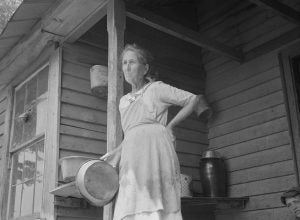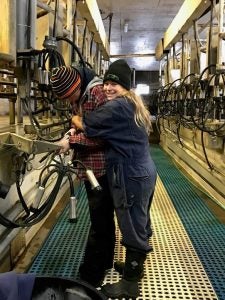A few months ago I sat in my living room discussing the marketing aspects of agriculture with a guy who had quite extensive experience in the subject. Whether a small homestead or large agribusiness, we both found it interesting that there was an image that engaged consumers every time: The farmer.
Animals can make great Instagram photos and videos (and I mean who hasn’t seen the baby goats in pajamas video), and is an abundance of pastoral images that include rolling pastures and historic farmsteads. Tractors and equipment are always impressive. But what “sells” — or, more importantly, gives credibility to the message — is always the farmer.
As technology increasingly takes over operations, I see so many corporations use images that are, for lack of a better word, sterile. Nothing about it is incorrect or misleading, just not always effective at making a good connection with consumers. And I’m saying all this as someone who loves technology and spent time in the corporate world. If I could completely mechanize my vegetable growing operations, I would do so in a heartbeat.
So why the credibility with the traditional farmer image?
I’ve spoken to countless individuals over the years, and I never fail to hear a story about their dad, mom, uncle, or brother who had a farm. Or the homestead that has been passed down over four generations, or the first-generation farmers who felt the calling to the land and want to pass it on to their children. It’s almost like they can’t wait to tell me the time they helped their Pawpaw harvest corn or Grandma snap beans on the porch.

People love farmers. And I know why. The other day, my wife was talking about her dad and brought up memories of him going out in the middle of winter during a snowstorm with his tractor to plow his neighbors driveways and pull motorists out of the ditch. Recently, a friend shared a memory of her mom who would plant extra in the garden and give half of it to those in need. And then there are the stories about the farmers who gather to help one another after a disaster.
Even things that seem almost inconsequential, like the time I drove to a neighboring farm after my dog took off and asked if they had seen him. “No, but we’ll keep an eye out,” they said. They didn’t just keep an eye out — they stopped what they were doing, got in their truck, and drove around helping us look. We went back home, and around 7 that evening they pulled up, with a happy dog sitting in the cab, and let us know, no thanks necessary, they’re just happy they found him and everything worked out OK.
People get it, and they trust that these men and women are made of something not many are: an immaterial goodness that is cultivated only by earning a living by the sweat of their brow and understanding that we all need one another if were going to get through the tough times and want to truly enjoy the good times.

And here’s the thing. All of these stories I hear really are generic, but no less special, in the sense that most everyone who knows a farmer has one to tell. It is a way of life, it’s how things are done. You love your neighbor, care for those in need and expect nothing in return. I get we may find such fine individuals in all walks of life, but there is confidence we will find them in numbers within any given agricultural community (I stood in line at Walmart one Christmas Eve, waiting to check out. The family in front of me came up short, and as they started to put things back, a policeman walked up, slid his own card through the reader and simply said, have a Merry Christmas).
Oh, and did you see that word I used? “Community.” You get enough of these folks together and you find yourself in a community. Sometimes you can go literal miles between homesteads, but help is just a phone call away.
So who better to legitimize a product or process, but a farmer? I have to warn you, though, if a farmer thinks your product is no good or they think what you’re selling is bogus, they’ll let you know that, too. Most are way too honest and have a problem keeping their opinions to themselves.
But really, I’m just expounding a little bit, and not nearly as eloquently, on what Paul Harvey already told us: God needed someone to remind us about humanity and what’s really important in life, so God made a Farmer.
Jonathan Lawler operates Brandywine Creek Farms in Indiana and is an advocate for hunger relief and agriculture. He is working on a TV show called Punk Rock Farmer coming soon. His motto is FARM OR DIE.



